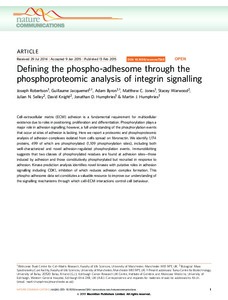Defining the phospho-adhesome through the phosphoproteomic analysis of integrin signalling
Robertson J; Jacquemet G; Byron A; Jones MC; Warwood S; Selley JN; Knight D; Humphries JD; Humphries MJ
Defining the phospho-adhesome through the phosphoproteomic analysis of integrin signalling
Robertson J
Jacquemet G
Byron A
Jones MC
Warwood S
Selley JN
Knight D
Humphries JD
Humphries MJ
NATURE PUBLISHING GROUP
Julkaisun pysyvä osoite on:
https://urn.fi/URN:NBN:fi-fe2021042716093
https://urn.fi/URN:NBN:fi-fe2021042716093
Tiivistelmä
Cell-extracellular matrix (ECM) adhesion is a fundamental requirement for multicellular existence due to roles in positioning, proliferation and differentiation. Phosphorylation plays a major role in adhesion signalling; however, a full understanding of the phosphorylation events that occur at sites of adhesion is lacking. Here we report a proteomic and phosphoproteomic analysis of adhesion complexes isolated from cells spread on fibronectin. We identify 1,174 proteins, 499 of which are phosphorylated (1,109 phosphorylation sites), including both well-characterized and novel adhesion-regulated phosphorylation events. Immunoblotting suggests that two classes of phosphorylated residues are found at adhesion sites-those induced by adhesion and those constitutively phosphorylated but recruited in response to adhesion. Kinase prediction analysis identifies novel kinases with putative roles in adhesion signalling including CDK1, inhibition of which reduces adhesion complex formation. This phospho-adhesome data set constitutes a valuable resource to improve our understanding of the signalling mechanisms through which cell-ECM interactions control cell behaviour.
Kokoelmat
- Rinnakkaistallenteet [29335]
